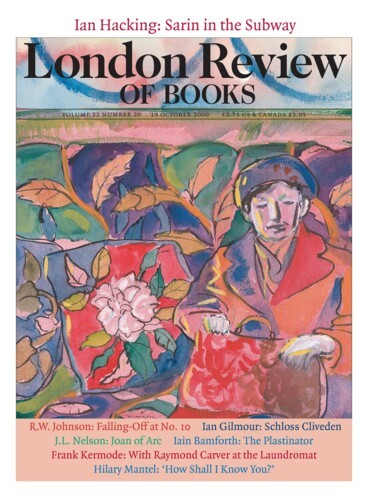Peter Lilley, an international fraud investigator and no relation of the Tory MP for Hitchin and Harpenden, has written a book called Dirty Dealing: The Untold Truth about Global Money Laundering (Kogan Page, £16.99). Before outlining how best to prevent the crime, he explains the various ways to go about committing it, such as opening an anonymous Austrian Sparbuch – savings book – of which there are estimated to be twenty-six million in existence (Austria, for the record, has a population of just over eight million). It’s also possible, apparently, to buy your own bank. If, on the other hand, the whole business of legitimising your hard-earned cash seems like too much trouble, you can always just spend it illegally. You could, for example, sell arms on one side of the world – with luck at a vastly inflated price to people you have little sympathy for – and use the profits to provide paramilitaries on the other side of the world whom you like rather better with free guns. If such behaviour goes against your pacifist sensibilities, you could always use your ill-gotten gains to buy stolen works of art. Should you decide to do so, however, you’d better watch out for Lord Renfrew of Kaimsthorn.
Colin Renfrew, as he’s probably better known, is the author of Loot, Legitimacy and Ownership: The Ethical Crisis in Archaeology (Duckworth, £9.99). ‘Clandestine and unpublished digging of archaeological sites for gain, i.e. looting . . . is the source of most of the antiquities that appear on the art market today – unprovenanced antiquities, the product of illicit traffic financed, knowingly or not, by the collect-ors and museums that buy them on a no-questions-asked basis.’ What’s wrong about this is that the information which ‘controlled and well-published excavations can give us about our shared human past’ is the ‘most precious product of archaeology’, and looting ‘destroys all hope of providing such information’. There are of course other forces (if that’s not too sinister a word) at work that threaten or diminish our understanding of heritage (if that’s not too etiolated a word), other places ‘where greed triumphs over serious appreciation of the past’: Las Vegas, Disneyland and any McDonald’s restaurant you care to think of spring to mind. Which makes it unfortunate that Renfrew is Disney Professor of Archaeology at Cambridge. He’s also Director of the McDonald Institute for Archaeological Research, but that turns out to be the endowment of ‘the late Dr D.M. McDonald, a well-known and successful industrialist’.
Louis de Bernières, presumably the Louis de Bernières who wrote Captain Corelli’s Mandolin, has written an indignant letter to the Author, the journal of the Society of Authors, ‘to inform you’ about what he considers to be the underhand behaviour of Peter Tummons, managing director of Methuen, who used to work at Random House, ‘who are my publishers’. Tummons and a pair of solicitors from a firm called Withers have registered Louis de Bernières Ltd at Companies House. De Bernières complains:
My name was used without my knowledge or consent, and this company has nothing to do with me whatsoever. I think that it would be wise for other writers (or their agents) to check with Companies House as to whether they too have been turned unawares into limited companies. As to what should be done next, perhaps the universally-acknowledged-to-be-reputable Withers of Goff Square might be able to advise.
The trouble is that de Bernières hasn’t got a legal leg to stand on. If he had, McDonald’s (of hamburger fame) would already have helped themselves to whatever they could swallow of Professor Renfrew’s Institute; the Tory MP for Hitchin and Harpenden would no doubt be trying to get his hands on any proceeds from Dirty Dealing; and Richard Ashcroft, a solicitor in the property department at Withers, would be trying to supplement his income with the royalties from Alone with Everybody and various old Verve albums (at the risk of being sued by the Rolling Stones). My name has been used without my knowledge or consent since before I was born, by among others an 18th-century landscape painter, who, had he been precociously litigious, could have tried to sue Henry Fielding for using his name without permission. There are no less than four limited companies called Thomas Jones, with or without sons and various parenthetical geographical locations.
While de Bernières is just going to have to get used to sharing his name, other novelists can indulge themselves for a bit longer. The Companies House website, at www.companies-house.gov.uk, offers the following near-misses (chosen, of course, at random): Martin Amos Services, Julian Barnett Productions, Anita Brook, A.S. Bunning, Margaret Dolphin, Ian Rankin Plastics Consultancy, J.K. Roofing, Salman Investments; for the authors on the Booker Prize shortlist, we have Margareta’s Gowns (Birmingham), Trez Motors, five variations on Michael Collins (but he’s probably used to it, since Liam Neeson starred as him in that Neil Jordan film a few years ago), Kazoo3D, Matthew Kallenberg-Pierce and Brian O’Connor; and then there’s Zadok and Zadok. Incidentally, de Bernières’s most successful novel is still safe: the nearest match to it, Captain Courageous Ltd, has recently been dissolved.
Send Letters To:
The Editor
London Review of Books,
28 Little Russell Street
London, WC1A 2HN
letters@lrb.co.uk
Please include name, address, and a telephone number.

